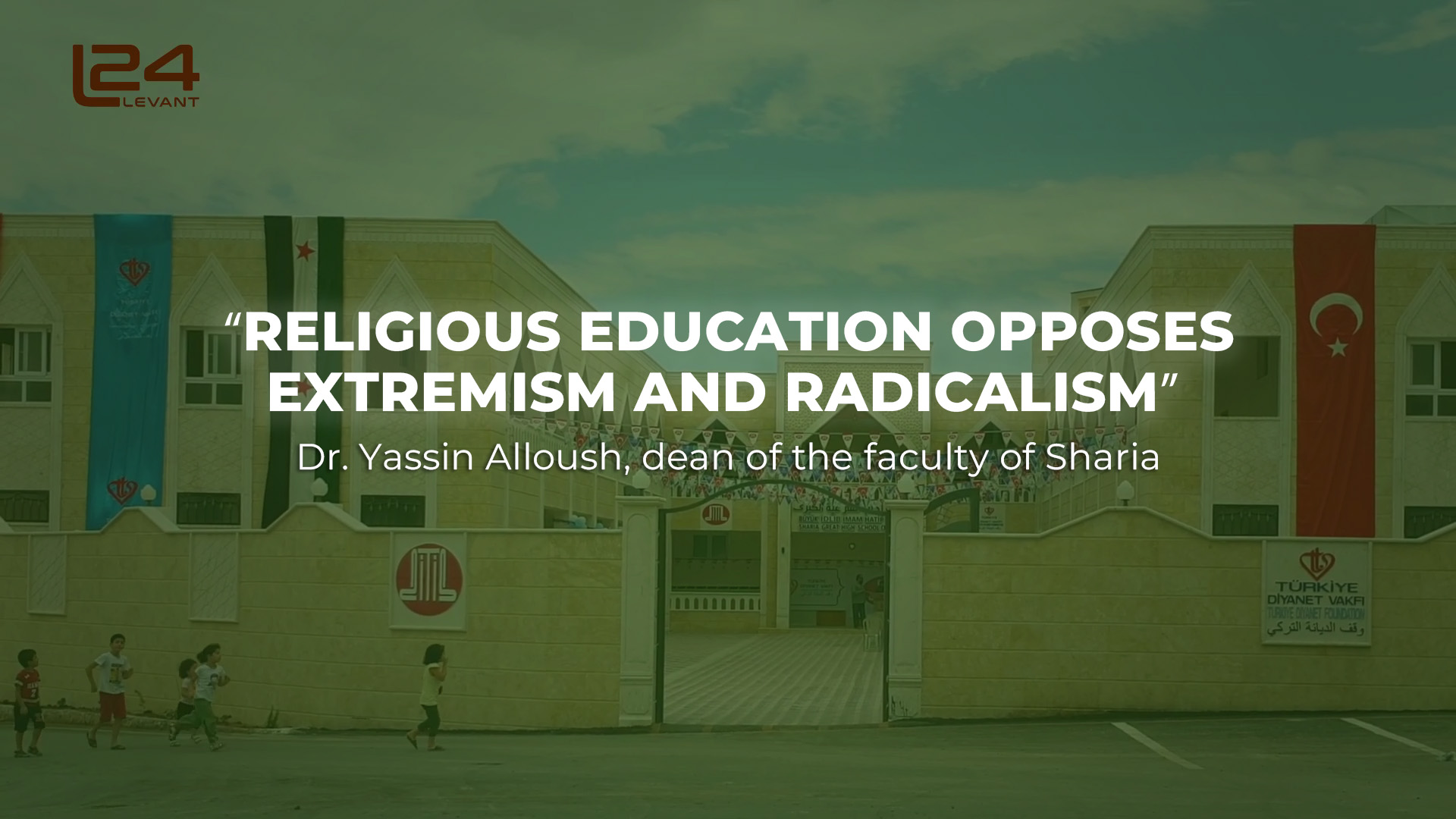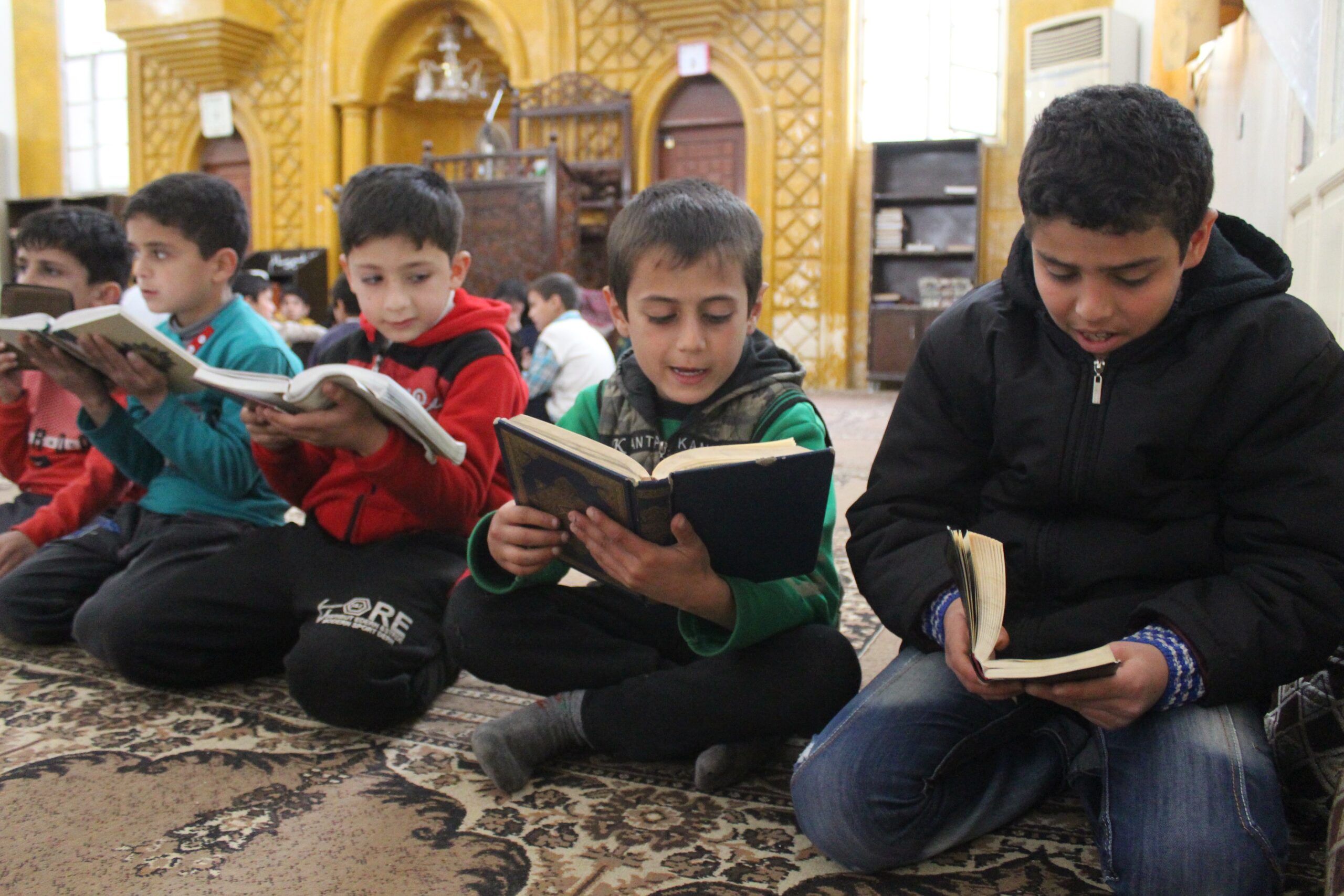
By, Ibrahim Harun
Idlib, northern Syria, has become a center of Islamic sciences, contributing to somewhat of a religious revival in the region. This “Islamic revival” encompasses all spheres of society, irrespective of age or gender. Religious education has become a fundamental part of society and people are embracing it across the board, with levels of learning ranging from basic lessons in the recitation of Quran to university degrees.
The recently constructed Idlib Grand Sharia High School is an embodiment of this rising trend. Built in cooperation with the Turkish Religion Foundation it is one of the largest such institutes in Idlib City and the region. While specializing in Sharia (Islamic sciences and jurisprudence) education it also offers a conventional academic curriculum alongside Islamic subjects. The school has multiple sections, accommodating a significant number of students and the program awards a high school diploma upon its completion.
Abdulrahman Ismail from the Education Office at the Turkish Religion Foundation, informed L24 “A student of Islamic knowledge can study subjects like medicine, engineering, dentistry, and similar fields.” He went on to speak of different sections for males and females “which is under discussion with the relevant authorities.”
Grassroots Revival
To further explore the matter, L24 spoke with Hamad Shuhoud, an imam, preacher, and graduate specialized in Sharia, who declared, “The field of religious education has undergone a qualitative transformation in the liberated region.” He went on to add, “Today, we see religious institutes spread across all disciplines. There is care and attention in this field.”
As for how this “transformation” has taken place, it can be described as somewhat of a revival stemming from grass-roots movements arising in tandem with the revolution. According to, Dr. Yassin Alloush, dean of the faculty of Sharia, “After the liberation of these areas, students of knowledge immediately began organizing Quranic teaching circles in mosques. Then, religious institutes and institutes for training preachers were established, followed by the creation of multiple Sharia colleges.” Dr. Alloush conveys how religious education was promoted by the local scholars, who doubled as the founders of many of the active institutes and colleges of Islamic studies.

Deep-Rooted and Balanced Identity
Growing acceptance and prioritization towards religious studies is observable today, elaborated on by Layla, who declared “I sincerely say, God willing, and this is from my observation of the reality in the liberated areas and my missionary work for more than ten years, that educational programs have entered every home in the liberated areas. You won’t find a house without a child memorizing two or three parts of the Holy Quran. It’s no secret that there are Quran memorization institutes in the mosques of Idlib for women and children.” Layla furthers that there are also regular scientific courses in various fields held in the mosques, all of which are free. He affirmed that Islamic knowledge is available to everyone, exclaiming “thanks to Allah, we witness a tremendous turnout of people seeking knowledge.”

Finally, regarding fears of extremism stemming from religious studies, Dr. Alloush affirms, “Religious education opposes extremism and radicalism because it fosters well-grounded religious knowledge, teaching the moderation of Islam. Extremism and radicalism tend to flourish in ignorant societies.” He points out that some people may have this false impression because ISIS recruited young people through “religious institutions”, for example, but the reality is that they were recruited from the internet rather than from Islamic institutions run by scholars, as is the case in Idlib.
From Baathist Suppression to Emerging Enthusiasm
Enthusiasm towards religious studies has not always been so high. Contrasting today’s scenario, Islamic studies were previously heavily restricted and its pursuers dealt with more strictly. According to Dr. Alloush “the oppressive (Assad) regime restricted religious education and controlled its facilities.” It was only afterward when the areas were liberated that, “preachers and students of knowledge found the opportunity to open these institutes and Sharia colleges and admitted students without interference from security agencies.” This indicates that what is happening within the region today is somewhat, due to the removal of excessive strictness and suppression from the government.
In a 2020 Report by the US Department of State’s Office of International Religious Freedom, on religious freedom in regime-run Syria, it is stated, “Membership in the Muslim Brotherhood or ‘Salafist’ organizations remains illegal and punishable with imprisonment or death.” Furthermore, the report states that “the law also charges the council with monitoring all fatwas (religious decrees) issued in the country and with preventing the spread of views associated with the Muslim Brotherhood or ‘Salafist’ activity, including ‘Wahhabism.’”

Further proof that the regime viewed mainstream Sunni Islam as a threat and hence suppressed its teachings is evident in the atrocities committed during the conflict.
A May report by the Carnegie Middle East Center stated, “The destruction during the conflict was not solely collateral damage. Its scale, nature, and consequences implied that it was used as a weapon of war to eradicate the populations of opposition areas,” and furthered, “additionally, many believe the damage took place along sectarian lines, with a majority of destroyed areas being Sunni.”
Idlib’s Islamic Future
The emerging Islamic revival in Idlib is marked by a significant increase in education and the establishment of numerous institutes and colleges dedicated to Islamic studies. It represents a trajectory that the revolution is taking of embracing the region’s dominant religion, both earnestly and moderately. It is a revival that has emerged organically, fueled by the enthusiasm and commitment of local scholars and students of knowledge. The liberation of these areas from the previous regime has provided the opportunity for religious freedoms to flourish, allowing individuals to pursue religious education and practice their faith.
Contrary to concerns about extremism, the focus on religious education serves to foster a deeper understanding of Islam and promote moderation and societal cohesion. The Baathist regime’s suppression of religious education and the restrictions it imposed on religious activities are now being replaced by an emerging enthusiasm based on a deep-rooted religious identity, ever present in the Syrian people. Idlib’s Islamic revival represents a significant shift in the recognition and value placed on religious education and its contribution to personal and communal development and thus it should be recognized as such.









